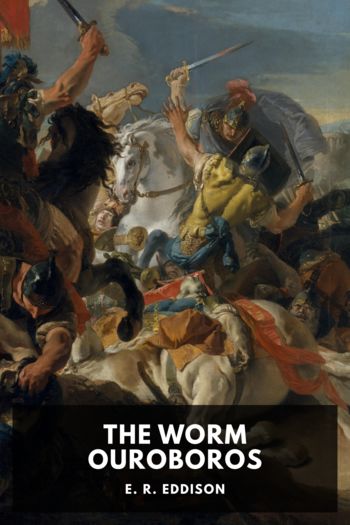The Cream of the Jest by James Branch Cabell (the first e reader TXT) 📕

- Author: James Branch Cabell
Book online «The Cream of the Jest by James Branch Cabell (the first e reader TXT) 📕». Author James Branch Cabell
Now these books by their pleasant display of gold-leaf, soberly aglow in lamplight, recalled an obscure association of other tiny brilliancies; and Felix Kennaston recollected the bit of metal he had found that evening.
Laid by the lamp, it shone agreeably as Kennaston puckered his protruding brows over the characters with which it was inscribed. So far as touched his chances of deciphering them, he knew all foreign languages were to him of almost equal inscrutability. French he could puzzle out, or even Latin, if you gave him plenty of time and a dictionary; but this inscription was not in Roman lettering. He wished, with time-dulled yearning, that he had been accorded a college education. …
XI How There Was a Light in the FogAs she came toward him through the fog, “How annoying it is,” she was saying plaintively, “that these moors are never properly lighted.”
“Ah, but you must not blame Ole-Luk-Oie,” he protested. “It is all the fault of Beatricê Cenci. …”
Then Kennaston knew he had unwittingly spoken magic words, for at once, just as he had seen it done in theaters, the girl’s face was shown him clearly in a patch of roseate light. It was the face of Ettarre.
“Things happen so in dreams,” he observed. “I know perfectly well I am dreaming, as I have very often known before this that I was dreaming. But it was always against some law to tell the people in my nightmares I quite understood they were not real people. Today in my daydream, and here again tonight, there is no such restriction; and lovely as you are, I know that you are just a daughter of subconsciousness or of memory or of jumpy nerves or, perhaps, of an improperly digested entrée.”
“No, I am real, Horvendile—but it is I who am dreaming you.”
“I had not thought to be a part of any woman’s dream nowadays. … Why do you call me Horvendile?”
She who bore the face of Ettarre pondered momentarily; and his heart moved with glad adoration.
“Now, by the beard of the prophet! I do not know,” the girl said, at last.
“The name means nothing to you?”
“I never heard it before. But it seemed natural, somehow—just as it did when you spoke of Ole-Luk-Oie and Beatricê Cenci.”
“But Ole-Luk-Oie is the lord and master of all dreams, of course. And that furtive long-dead Roman girl has often troubled my dreams. When I was a boy, you conceive, there was in my room at the first boardinghouse in which I can remember dieting, a copy of the Guido portrait of Beatricê Cenci—a copy done in oils, a worthless daub, I suppose. But there was evil in the picture—a lurking devilishness, which waited patiently and alertly until I should do what that silent watcher knew I was predestined to do, and, being malevolent, wanted me to do. I knew nothing then of Beatricê Cenci, mark you, but when I came to learn her history I thought the world was all wrong about her. That woman was evil, whatever verse-makers may have fabled, I thought for a long while. … Today I believe the evil emanated from the person who painted that particular copy. I do not know who that person was, I never shall know. But the black magic of that person’s work was very potent.”
And Kennaston looked about him now, to find fog everywhere—impenetrable vapors which vaguely showed pearl-colored radiancies here and there, but no determinable forms of trees or of houses, or of anything save the face of Ettarre, so clearly discerned and so lovely in that strange separate cloud of roseate light.
“Ah, yes, those little magics”—it was the girl who spoke—“those futile troubling necromancies that are wrought by portraits and unfamiliar rooms and mirrors and all timeworn glittering objects—by running waters and the wind’s persistency, and by lonely summer noons in forests—how inconsequently they fret upon men’s heartstrings!”
“As if some very feeble force—say, a maimed elf—were trying to attract your attention? Yes, I think I understand. It is droll.”
“And how droll, too, it is how quickly we communicate our thoughts—even though, if you notice, you are not really speaking, because your lips are not moving at all.”
“No, they never do in dreams. One never seems, in fact, to use one’s mouth—you never actually eat anything, you may also notice, in dreams, even though food is very often at hand. I suppose it is because all dream food is akin to the pomegranates of Persephone, so that if you taste it you cannot ever return again to the workaday world. … But why, I wonder, are we having the same dream?—it rather savors of Morphean parsimony, don’t you think, thus to make one nightmare serve for two people? Or perhaps it is the bit of metal I found this afternoon—”
And the girl nodded. “Yes, it is on account of the sigil of Scoteia. I have the other half, you know.”
“What does this mean, Ettarre—?” he began; and reaching forward, was about to touch her, when the universe seemed to fold about him, just as a hand closes. …
And Felix Kennaston was sitting at the writing-table in the library, with a gleaming scrap of metal before him; and, as the clock showed, it was bedtime.
“Well, it is undoubtedly quaint how dreams draw sustenance from half-forgotten happenings,” he reflected; “to think of my recollecting that weird daub which used to deface my room in Fairhaven! I had forgotten Beatricê





Comments (0)